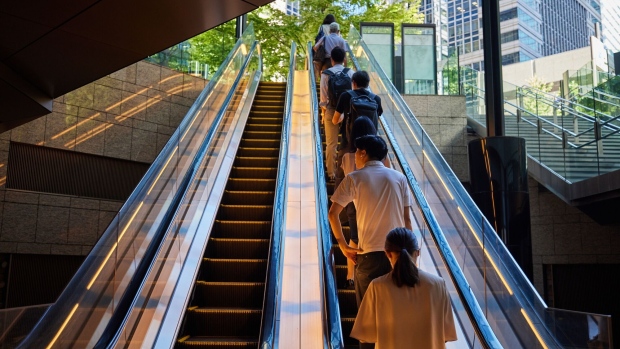Oct 18, 2023
Japan’s Labor Union Set to Demand More Pay Hikes for Next Year
, Bloomberg News

(Bloomberg) -- Japan’s largest labor union federation demanded higher pay increases for next year, potentially providing the key element needed for the central bank to move toward policy normalization.
Rengo, the country’s biggest trade union federation, called for companies to raise wages by “at least 5%” in principle Thursday, as part of its basic vision for wage negotiations that culminate in the spring. The goal is slightly more ambitious than the one set before this year’s talks, when the union sought an “about 5%” increase.
“Our goal is at least 5%, so we hope those who are doing well to have a higher demand than 5%,” said Rengo’s chief Tomoko Yoshino. “We will strengthen our efforts to achieve results that exceed this year’s.”
The higher goal may be one factor that convinces the Bank of Japan that wage hike momentum is likely to be sustained following this year’s historic pay gains. Governor Kazuo Ueda has repeatedly suggested that rising salaries are a key factor in achieving the goal of sustainable inflation, which is a precondition for scaling back ongoing stimulus.
Ueda earlier mentioned the possibility that the BOJ might have enough evidence to determine the sustainability of wage increases by the end of the year, in an interview with the Yomiuri newspaper. The announcement of Rengo’s target may be one event that Ueda had in mind.
“The BOJ may take Rengo’s request as a sign that momentum for wage increases is building,” said Yohei Nishino at Mizuho Research & Technologies’ research division. Still, Nishino said the minor change in language alone isn’t likely enough to convince the BOJ about the sustainability of wage growth or the need for a policy pivot.
“The BOJ should judge the trend once Rengo compiles requests from member companies in early March,” he said.
The goal for 2024 includes base salary increases of 3% or more. BOJ board member Asahi Noguchi recently said that base pay needs to increase at a pace close to 3% as a trend for the bank’s stable price target to be met.
During this year’s spring pay negotiations, workers ultimately won a 3.58% wage rise, the largest gains in around 30 years, with a 2.12% hike for base pay. But the strong gain appears to have been offset by inflation. Real wages for Japanese workers have continued to fall, while nominal pay has stagnated after rising sharply in May and June due to one-time factors.
“Some SMEs have already voiced concerns that it will be difficult to continue raising wages next year,” Yoshino said when asked why Rengo decided not to change the target figure itself from 5%. “Hiking pay for smaller firms or non-regular workers is especially important to close the gap and raise the bottom line,” said Yoshino.
Yoshino also said that Rengo will consider proposing measures to encourage firms to further pass on costs, including labor costs, to consumers.
Prime Minister Fumio Kishida is also paying close attention to wage negotiations, given his vision for fairer income distribution. The premier met with Rengo head Yoshino on Wednesday and agreed that it is important to achieve sustained wage increases.
Following Rengo’s goal announcement, major Japanese companies may begin disclosing their individual wage hike intentions toward the end of the year. Meiji Yasuda Life Insurance Co. is already among the firms that plan to raise employee salaries, according to NHK. The broadcaster said the insurance company plans to boost wages by an average 7% for around 10,000 workers from April.
Last year Uniqlo operator Fast Retailing Co. said in early January that it would raise salaries by up to 40%, encouraging others to follow suit.
Considering factors including Rengo’s more ambitious demand, strong corporate earnings and labor shortages, next year’s wage increase could be higher than expected, according to Mizuho’s Nishino.
(Updates with trade union chief comments, other details)
©2023 Bloomberg L.P.





